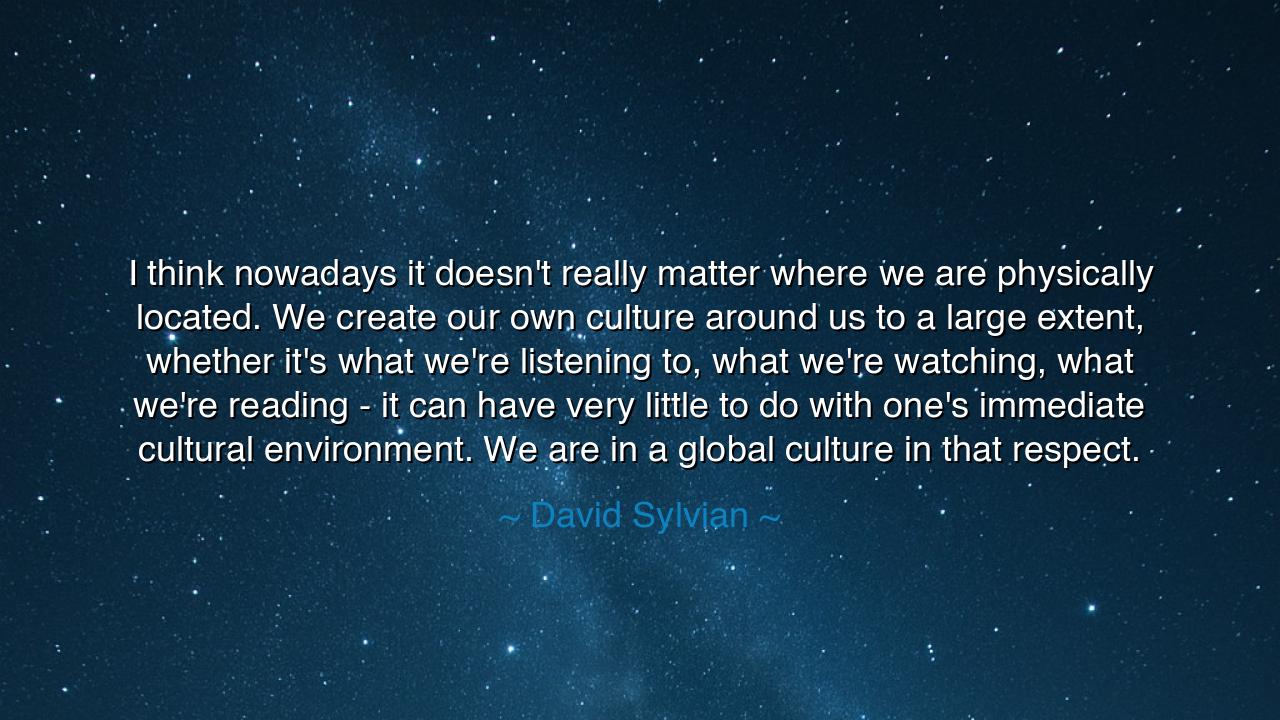
I think nowadays it doesn't really matter where we are physically
I think nowadays it doesn't really matter where we are physically located. We create our own culture around us to a large extent, whether it's what we're listening to, what we're watching, what we're reading - it can have very little to do with one's immediate cultural environment. We are in a global culture in that respect.






When David Sylvian declared, “I think nowadays it doesn’t really matter where we are physically located. We create our own culture around us to a large extent, whether it’s what we’re listening to, what we’re watching, what we’re reading — it can have very little to do with one’s immediate cultural environment. We are in a global culture in that respect,” he spoke as one who had witnessed the dissolving of boundaries that once confined human thought. His words reveal the great transformation of our age: that the village is no longer bound by its walls, nor the soul by the land of its birth, for now ideas and images flow as freely as the wind across mountains and seas.
The meaning of his statement lies in the profound shift from the local to the global. In earlier centuries, the songs you heard, the tales you cherished, the customs you followed were drawn from the soil beneath your feet and the voices of your neighbors. But Sylvian points to a new reality: that the books we read, the music we treasure, the films we watch may come from lands we have never touched. A child in Asia may grow up with the same rhythms and images as a child in Europe, and a dreamer in South America may be inspired by the same voices as one in Africa. The cultural environment is no longer confined to place, but chosen freely by each soul.
The origin of this vision lies in the rise of global communication and media. The printing press once carried the Bible and revolutionary tracts across borders; the telegraph collapsed the distance of continents; the radio and television brought voices into homes that would never otherwise be heard. But now, with the digital age, Sylvian’s truth has reached its zenith: in a single moment, a poem from the East may be read in the West, a song born in the South may stir hearts in the North. The global culture he names is not prophecy but reality.
History shows us this pattern in earlier forms. Consider Alexander the Great, whose conquests blended the traditions of Greece with those of Egypt, Persia, and India. He forged the Hellenistic culture, where local customs mingled with foreign thought, birthing new philosophies, sciences, and arts. Or recall the Silk Road, where traders carried not only silk and spices but stories, music, and faiths, weaving together civilizations across deserts and seas. These were ancient foreshadowings of Sylvian’s claim: that culture is not bound to geography, but flows where minds and hearts are open.
Yet his words also carry warning. If we are free to shape our own culture, we must also be mindful of what we choose to let into our hearts. Not all voices uplift, not all images inspire. In the sea of the global culture, there are currents that strengthen the soul and currents that drown it. To create one’s own culture is a freedom, but also a responsibility — to choose wisely, to cultivate beauty, truth, and wisdom rather than to surrender to noise and distraction.
The lesson, then, is timeless: you are the architect of your cultural world. Though you may be born in one place, your spirit is not bound there. Choose what you hear, what you read, what you watch, with care, for these choices build the temple of your mind. Recognize, too, the power of this global culture to unite rather than divide — to see that the stories you cherish may be shared by others far away, making strangers into kin and the world into a single family.
Practical actions arise naturally. Seek out voices from beyond your borders. Read the literature of distant lands, listen to the music of other tongues, open yourself to the art and wisdom of peoples you have never seen. At the same time, preserve and honor the treasures of your own local roots, so that the global culture does not erase but enriches. In this way, you build a bridge between the immediate and the universal, carrying your heritage into the great tapestry of mankind.
Thus, David Sylvian’s words stand as both testimony and guidance: that in this age, location no longer confines the soul, and that we live within a global culture of our own making. May we learn to shape it with wisdom, to honor its power, and to use it not to forget who we are, but to see more clearly the shared humanity that binds us all.






AAdministratorAdministrator
Welcome, honored guests. Please leave a comment, we will respond soon